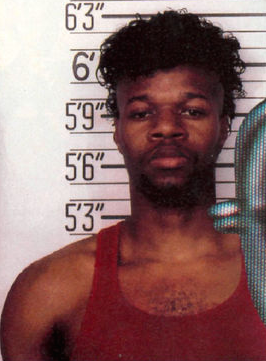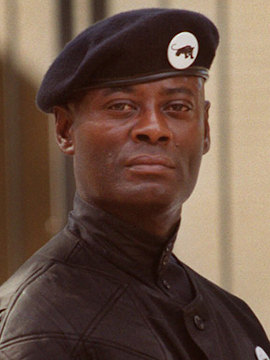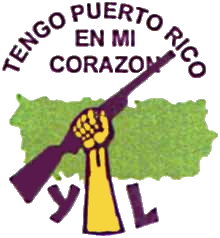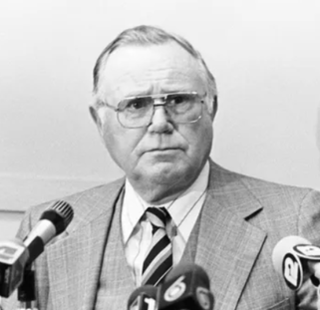
Jeffrey Lionel Dahmer, also known as the Milwaukee Cannibal or the Milwaukee Monster, was an American serial killer and sex offender who killed and dismembered seventeen males between 1978 and 1991. Many of his later murders involved necrophilia, cannibalism, and the permanent preservation of body parts—typically all or part of the skeleton.

Christopher J. Scarver Sr. is an American convicted murderer. He is best known for the 1994 murders of his fellow inmates Jeffrey Dahmer and Jesse Anderson, both convicted murderers, at the Columbia Correctional Institution in Wisconsin. The three inmates were on a work detail together in the prison gymnasium, and had a confrontation while unsupervised. Scarver found a metal bar that he used to beat and fatally injure Dahmer and Anderson. Scarver was convicted and sentenced to two further life sentences for these murders. He had already been sentenced to life in prison after being convicted of the murder of Steve Lohman in 1990.

The New Black Panther Party (NBPP) is an American black nationalist organization founded in Dallas, Texas, in 1989. Despite its name, the NBPP is not an official successor to the Black Panther Party. Members of the original Black Panther Party have insisted that the new party has no legitimacy and "there is no new Black Panther Party".

Khalid Abdul Muhammad was an African-American Muslim minister and activist who became a prominent figure in the Nation of Islam and later the New Black Panther Party. After a racially inflammatory 1993 speech at Kean College, Muhammad was condemned and removed from his position in the Nation of Islam by Louis Farrakhan. He was also censured by both Houses of the United States Congress.

John Olof Norquist is a retired American politician, urbanist consultant, and author. He served as the 43rd mayor of Milwaukee, Wisconsin, winning four terms (1988–2004). He previously represented Milwaukee's south side in the Wisconsin State Assembly (1975–1983) and Wisconsin Senate (1983–1988). After serving as mayor, he worked for ten years as president of the Congress for the New Urbanism.

The Young Lords, also known as the Young Lords Organization (YLO) or Young Lords Party (YLP), was a Chicago-based street gang that became a civil and human rights organization. The group aimed to fight for neighborhood empowerment and self-determination for Puerto Rico, Latinos, and colonized people. Tactics used by the Young Lords include mass education, canvassing, community programs, occupations, and direct confrontation. The Young Lords became targets of the United States FBI's COINTELPRO program.

Underground Resistance are an American musical collective from Detroit, Michigan. Producing primarily Detroit techno since 1990 with a grungy four-track musical aesthetic, they are also renowned for their militant political and anti-corporate ethos.

Henry Walter Maier was an American politician and the longest-serving mayor of Milwaukee, Wisconsin, holding office from 1960 to 1988. A Democrat, Maier was a powerful and controversial figure, presiding over an era of economic and political turbulence for the city of Milwaukee.
John A. Balcerzak is an American former police officer from Milwaukee, Wisconsin.

Jesse Michael Anderson was an American convicted of the murder of his wife, Barbara Anderson. He had also wounded himself at the time, and told police that the couple had been attacked by two black men.
Edward Michael McCann is an American attorney and politician who served as district attorney of Milwaukee County, Wisconsin from 1969 to 2007. A Democrat, McCann gained recognition for the length of his tenure and his successful record as a trial attorney.

Vernon Ferdinand Dahmer Sr. was an American civil rights movement leader and president of the Forrest County chapter of the NAACP in Hattiesburg, Mississippi. He was murdered by the White Knights of the Ku Klux Klan for his work on recruiting Black Americans to vote.

The Republican Party of Louisiana(LAGOP) (French: Parti républicain de Louisiane, Spanish: Partido Republicano de Luisiana) is the affiliate of the Republican Party in the U.S. state of Louisiana. Its chair is Louis Gurvich, who was elected in 2018. It is currently the dominant party in the state, controlling all but one of Louisiana's six U.S. House seats, both U.S. Senate seats, all statewide executive offices, and both houses of the state legislature.

The New Panther Vanguard Movement (NPVM), originally known as the New African American Vanguard Movement (NAAVM) was created in South Central Los Angeles in 1994 as a response to the Los Angeles riots of 1992. Former members of the Black Panther Party and other community activists came together after the riots and shared their frustration with the lack of leadership in the Black community. After various dialogues, they decided to create a grassroots organization that would reflect the vision and community spirit of the Black Panther Party.
Michael Imanu McGee Jr., is an American politician who served as alderman of Milwaukee's Sixth District. He was elected in April 2004 to become along with his father, former alderman Michael McGee Sr., the first father and son in the history of Milwaukee to serve on the Common Council. His controversial tenure on the Milwaukee Common Council culminated in his arrest on Memorial Day weekend, 2007. He subsequently won the primary election from jail and lost the general election for re-election.

Robert James Parins was an American lawyer, judge, and National Football League executive. He was president of the Green Bay Packers from 1982 to 1989, and served in various other leadership roles in the Packers organization. He previously served 14 years as a Wisconsin circuit court judge in Brown County (1968–1982) and served two years as district attorney (1949–1951). Later in life, acting as a reserve judge, he played a notable role in a case related to the American serial killer Jeffrey Dahmer.
The British Black Panthers (BBP) or the British Black Panther movement (BPM) was a Black Power organisation in the United Kingdom that fought for the rights of black people and racial minorities in the country. The BBP were inspired by the US Black Panther Party, though they were unaffiliated with them. The British Panthers adopted the principle of political blackness, which included activists of black as well as South Asian origin. The movement started in 1968 and lasted until around 1973.
Lucille Berrien is an activist from Milwaukee. She was good friends with fellow Open housing advocate James Groppi. She ran for mayor of Milwaukee in 1972, becoming the first African-American woman to do so, but lost the race to incumbent Henry Maier. Though she had recently joined the Black Panther Party, she ran a non-partisan race for mayor. Berrien also ran for State Treasurer of Wisconsin in 1990 with the Labor–Farm Party of Wisconsin, but lost to Cathy Zeuske.
Intercommunalism is an ideology which was adopted by the Oakland chapter of the Black Panther Party after its turn away from revolutionary nationalism in 1970. According to Huey P. Newton the development of intercommunalism was necessary "because nations have been transformed into communities of the world." Intercommunalists believe that most forms of nationalism are obsolescent, because international corporations and technologically advanced imperialist states have reduced most nations down to a series of discrete communities which exist to supply an imperial center, a situation called reactionary intercommunalism. They also believe this situation can be transformed into revolutionary intercommunalism and eventually communism if communities are able to link "liberated zones" together into a united front against imperialism. Intercommunalism is a lesser-known aspect of the Panthers' legacy as much of its development occurred at the height of the party's suppression and reorientation towards survival programs.

The 1996 Milwaukee mayoral election was held on March 19, 1996, to elect the mayor of Milwaukee. Incumbent mayor John Norquist was re-elected to a third term in office.














